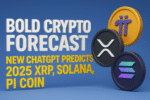Next-Gen Blockchain Claims to Outpace Solana’s Throughput
Venom Foundation’s native token saw a notable price spike after the team revealed its layer-1 blockchain achieved 150,000 transactions per second (TPS) during a closed-network stress test on May 23. The result, if sustained on mainnet, would position Venom as one of the highest-performing blockchains globally.
To put that into perspective, Solana, often touted for its speed, has a theoretical limit of 65,000 TPS, while Visa maxes out around 24,000 TPS. Venom’s breakthrough pushed its token up 2%, touching a daily high of $0.1031 following the announcement.
Mainnet Launch on the Horizon for Q3 2025
The Venom Foundation confirmed the stress test results ahead of its anticipated mainnet launch in Q3 2025. The success of this beta performance test marks a critical milestone as the project eyes enterprise adoption in sectors that require rapid, scalable settlement—like payment networks, exchanges, and GameFi protocols.
“Throughput only matters if it can remain reliable under pressure,” said Christopher Louis, CEO of Venom Foundation. “Our stack can now handle enterprise-scale workloads without fee spikes or sacrificing decentralization.”
DAG Architecture: A Key to Scalability
Unlike traditional blockchains that confirm transactions sequentially, Venom uses Directed Acyclic Graph (DAG) technology. This allows parallel processing of transactions as long as they don’t conflict, offering a dramatic leap in network performance and efficiency.
This architecture makes Venom particularly attractive for enterprise-scale DeFi, where speed and stability are critical. By enabling concurrent transaction processing, the network minimizes latency and congestion, two of the biggest pain points in existing DeFi infrastructure.
Foundation Eyes Enterprise DeFi Adoption
Backed by a non-profit based in Abu Dhabi and registered in the Cayman Islands, the Venom Foundation aims to build an institutional-grade, layer-1 blockchain designed specifically for high-throughput DeFi environments.
Their goal: support next-gen decentralized finance platforms that demand scalability without compromising on decentralization or fee control—something only a few networks have managed to achieve so far.










